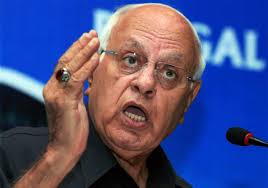 Baramulla (JK), Apr 16: Union Minister Farooq Abdullah today claimed that BJP's Prime Ministerial candidate Narendra Modi wants to "eliminate" Muslims but expressed confidence that Congress will not allow him to succeed in his designs.
Baramulla (JK), Apr 16: Union Minister Farooq Abdullah today claimed that BJP's Prime Ministerial candidate Narendra Modi wants to "eliminate" Muslims but expressed confidence that Congress will not allow him to succeed in his designs.
"I do not fear Modi but his intentions, which he has for India. He wants to eliminate Muslims if you want to hear the truth," Abdullah, also president of ruling National Conference in J-K, told reporters here, about 55 kms from Srinagar.
He (Modi) wants to play "communal politics and is taking the country towards communalism", Abdullah said.
He, however, said that Congress is steadfast to fight him.
Abdullah, who is seeking re-election from Srinagar Lok Sabha seat, said the state government was committed to revoking Armed Forces Special Powers Act (AFSPA) and asked Pakistan to stop pushing militants into the state.
"The government is committed that AFSPA has to be removed from the areas where it is not needed. There is no difficulty about that," he said, adding "I hope our friends in Pakistan would stop sending militants then probably AFSPA would go completely."
Meanwhile, Jammu and Kashmir Congress President Saif-ud-din Soz criticised the Election Commission (EC) for its failure to take action against Modi for his spendings on election campaign through media houses in the country.
"The EC has to think and see how much money does Modi have. There is a charge on him as a few days back there was a media report that he has spent Rs 5,000 crore on media.
"He (Modi) is given a huge space on television channels why isn't Advani or Rahul Gandhi or even Sonia Gandhi not given such a coverage. That is why EC has to think about it. The EC is not above law. That is my point," Soz said.
The state Congress president denied inclusion of demand for Union Territory Status to frontier Ladakh region saying "it is not the manifesto of Congress but a local demand."
"It (demand for Union Territory Status) is a local issue and not of the whole state. The hill council (Ladakh Autonomous Hill Development Council) that has demanded it and we have not said no but if it would have been achievable, then it would have been done. We do not know if that is achievable or not but it is not the manifesto of Congress," Soz said.
Abdullah and Soz were in this north Kashmir town to accompany the joint candidate Sharief-ud-din Shariq who filed his nomination papers today.
Shariq, a senior National Conference leader and sitting MP, is contesting from Baramulla Lok Sabha seat which is going to polls in the last phase of the five-phased elections in the state on May 7.





Comments
Add new comment